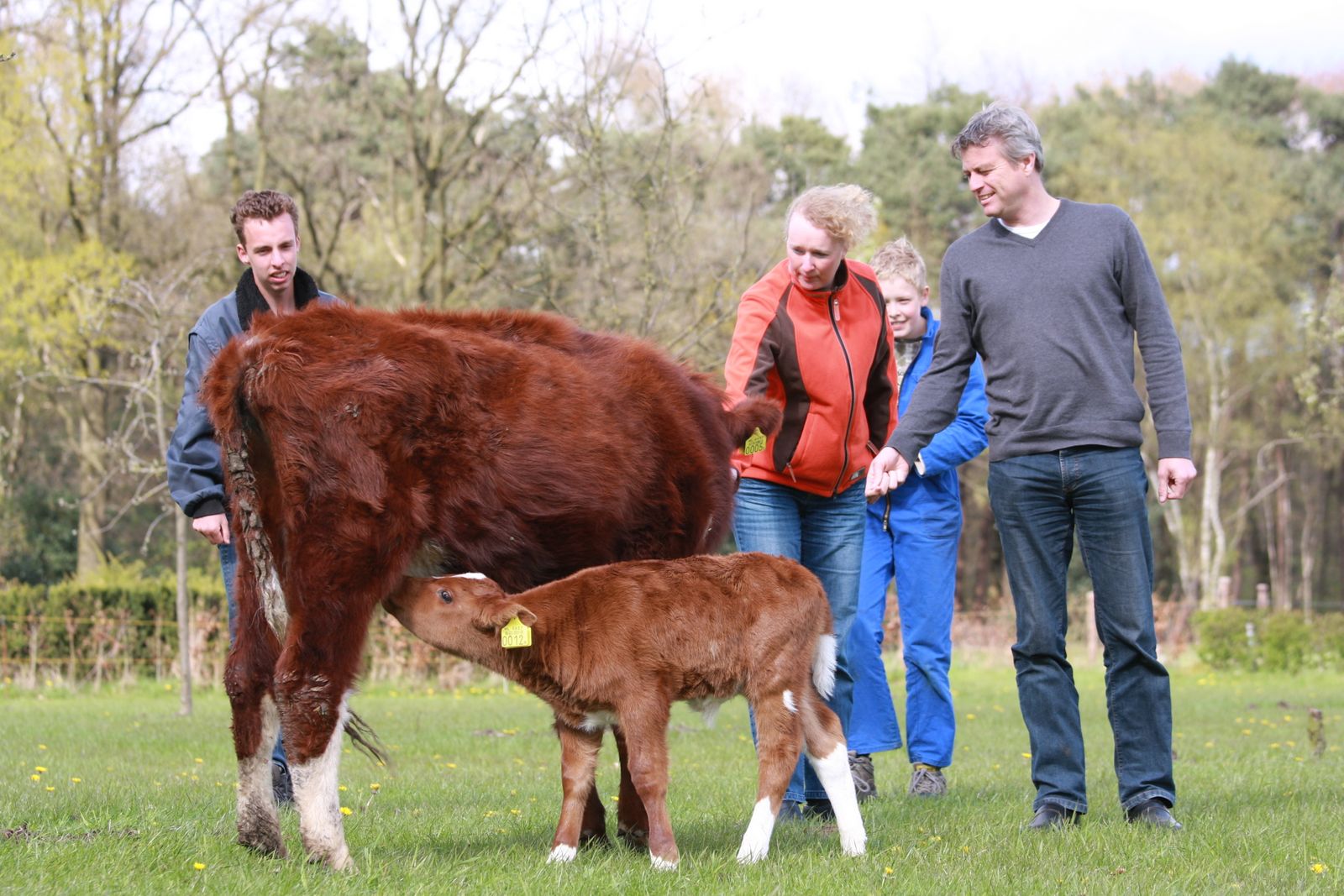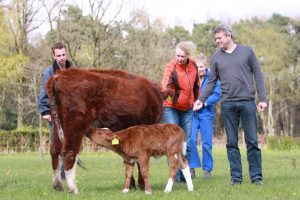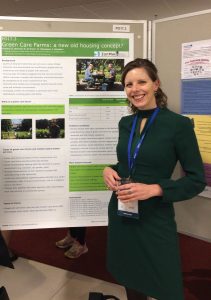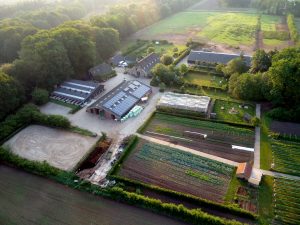People with Dementia Find Fresh ‘Meaning in Life’ at Dutch Care Farms
Written by |

Young clients join Caroline and IJsbrand Snoeij in watching a calf feeding at the Paradise care farm. (Photo courtesy of Caroline Snoeij)
Caroline Snoeij remembers a 94-year-old man with dementia weighing whether to make healthcare-related visits to her farm in central Holland. “I’ll come if you’ll let me clean the outside of the eggs” your chickens lay, he said in his best bargaining tone.
A bemused Caroline and her husband IJsbrand agreed. The old-timer joined three dozen others with dementia in coming to the farm one or more days a week to benefit from being outdoors, active and feeling like they’re accomplishing something.
The Snoeijs run a care farm, an operation that combines agriculture with care for people with Alzheimer’s and other types of dementia, children with autism, and young and middle-aged adults with mental health or other conditions.
Care farms began popping up in the Netherlands three decades ago. The idea behind the movement was to make farms multi-purpose, producing food but also meeting healthcare, recreation, conservation, and educational needs.
The healthcare part of the concept has worked so well that the number of care farms has exploded from 70 in the late 1990s to 1,400 today, said Simone de Bruin. A senior researcher at a government institute, de Bruin studies care for older people and innovation in healthcare and social services delivery.
About a fourth of Holland’s care farms cater to people with dementia. Intrigued by the concept, two countries with aging populations — Japan and South Korea — have sent delegations to check out the Snoeijs’ Paradise operation.
De Bruin, who like Caroline Snoeij spoke with Alzheimer’s News Today in a phone interview, said all care farms earn income by providing health and social services. Many also continue to generate revenue from agriculture.
Outdoor areas, gardens and animals at the non-commercial-agriculture farms are sources of therapy or daytime diversions for their various client groups, helping people relax, become healthier, and find purpose.
Holland’s healthcare and social services system provides adult day-care services to people with dementia, said de Bruin, who works for the Dutch National Institute for Public Health and the Environment (RIVM) in Bilthoven. Visits to care farms fall into this category, and the government reimburses the farms for this service.
“Most people with dementia who visit care farms live at home and go to the farms two to three days a week, arriving about 10 a.m. and leaving about 4 p.m.,” said de Bruin, who has a doctorate in public health from Wageningen University. A fraction reside on the few farms that offer 24-hour nursing home care, she added.
Many care farms are run by couples, with the husband overseeing the agricultural side and the wife the healthcare side, de Bruin said. That’s the case with the Snoeijs. IJsbrand has master’s degrees in agriculture and business from Wageningen University. Caroline is finishing a bachelor’s degree in contextual healthcare at Ede Christian University, after earning an education degree and teaching.
“Not only are people with dementia more active at care farms, but the farms stimulate social interaction and meaning in life,” de Bruin said. “Compared with traditional long-term care institutions, we see people at care farms participating more often in both domestic and outdoor activities, and spending less time on passive or purposeless activities.
“They tell us the farms make them feel like they’re still contributing to society.”
The farms are also a welcome break for caregivers. “It’s like a respite service for them,” she added.
Because research shows that care farms can improve a dementia patient’s quality of life, urban care centers have begun adopting some of their features — like arranging for people to spend more time outdoors. “Care farm operators can be really creative in meeting people with dementia’s needs,” she said. “They have this intrinsic motivation to deliver good care.”
De Bruin has seen a gender split in activity preferences at the 40 care farms she has visited. Men prefer gardening, feeding animals, and sweeping the farmyard. Women like picking fresh vegetables for cooking, preparing lunch, and tidying up — like washing dishes.
The Snoeijs started a consulting service in 2000 for farmers who were thinking about adding a care function. In 2005, an older couple they were advising asked them to find a buyer for their farm, who would continue using it to care for people with dementia. “They were in their early 60s,” Caroline said. “They had milk cows and calves, were having physical problems, and their children didn’t want to take over.”
An angel investor gave the Snoeijs a loan to buy the farm.
“We started 14 years ago, with only our children helping us,” Caroline said. “Now we have 24 employees, including 13 full time. Three-fourths are educated in care and one-fourth in agriculture.” The staff includes teachers for students whose conditions make it challenging for them to attend regular schools; volunteers perform such tasks as driving people with dementia to and from the operation.
The farm serves people with dementia on weekdays, then shifts to children with autism, who stay overnight on Friday and Saturday and return home on Sunday. About 90 children arrive in a typical month, Caroline said.
Unlike the Paradise operation’s elderly clients, the weekenders “can help feed the pigs, help with the meat cows, help collect the 8,000 eggs a day our hens lay, and help with vegetables and fruit in the summer and fall,” she added.
Because the farm has so many employees and care recipients these days, she spends more time overseeing it than working with people, as she once did. IJsbrand concentrates on agricultural operations, his role as president of an association of 700 organic farms, and advisory work with the agricultural ministry.
But he loves working with autistic children and is charmed by their enthusiasm, so every Saturday he and his young charges don overalls and collect eggs.
“One day a little girl told him, ‘Oh, farmer, you have so many eggs — you are rich,’” Caroline said. On another day, a girl decided it would be more fun carrying around a chicken than gathering eggs.
Some children become fascinated with the farm’s egg-sorting machine, wanting to know exactly how it works, IJsbrand said.
“If my husband collected and sorted the eggs himself, it would take an hour,” Caroline said. “Working with the children takes three hours — but that is the way he wants to do it.”
Like the children, people with dementia bring smiles to the Snoeijs’ faces. A visiting researcher once asked two older clients about the operation. “Well, the couple who run it are very nice, but they don’t know anything about farming, so we tell them how to do it,” one confided.
It was one of thousands of heart-warming moments that the Snoeijs have deposited in their memory bank.








